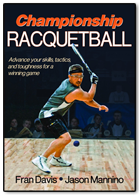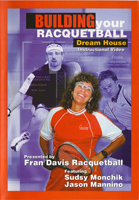 All amateur matches are two out of three games; the first two games are to 15 and the tiebreaker to 11. You receive three 30-second time-outs in a 15-point game and two 30-second time-outs in a tiebreaker. The pros play three out of five to 11 and receive only 1 minute time-out in a game. There is more than one reason to take a time-out. You can use a time-out to:
All amateur matches are two out of three games; the first two games are to 15 and the tiebreaker to 11. You receive three 30-second time-outs in a 15-point game and two 30-second time-outs in a tiebreaker. The pros play three out of five to 11 and receive only 1 minute time-out in a game. There is more than one reason to take a time-out. You can use a time-out to:
*recover from a long rally if you are tired and need to catch your breath;
*change the momentum of the match and stop the flow of points if your opponent is rattling off unanswered points;
*regroup and review your game plan if you lose your concentration so you can get back on track by making adjustments where necessary;
*change your opponent’s rhythm and tempo because this makes them uncomfortable; and
*get rid of negative thoughts because negativity breeds negativity, and you will not play at your best.
You should never have any time-outs remaining, especially if you have lost the game or match, because then you haven’t done everything in your power to try to win.
I have witnessed my players “Using Their Time Outs Effectively”:
Rocky Carson versus Alvaro Beltran in the semifinals of the 2013 US Open:
After losing to Alvaro in the first game and was down 2-7 in the second game on his way to be going down 0-2 games I had Rocky call a “TIME OUT”. I reminded Rocky to focus on playing one point at a time and we made some important strategic adjustments during the time out. Rocky, regrouped and came back and won the second game to even the match 1-1 in games. The rest was history as he won the next two games in the semi-finals to win 3-1 in games to advance to the finals.
Paola Longoria versus Marie Vargas in the finals of the LPRT 2014 Grand Slam in San Luis Potosi, MX:
Paola won the first game easily and found herself down in the 2nd game big 2-9, as Marie got hot and served extremely well. I asked Paola to take a “TIME OUT”, which she did. I told her to stop thinking of the future and play one point at a time. We also made some technical and strategic adjustments, which Paola responded well to. Paola regrouped and came back in and won the 2nd game 12-10 and then won the 3rd game to win the match 3-0. The rest was history as she kept her streak alive.
Jason Mannino versus Jack Huzek in the famous semi-finals match at the 2006 US Open:
Jason found himself in the 5th game tiebreaker, down 2-10 in the semi-finals. During the “TIME OUT” I just kept reminding him of, play in the now and one point at a time. I knew if he did not do that and worried about the future of losing the match he would have done just that. He was so present and focused on one point at a time as he could hear the crowd cheering for him until he beat Jack 12-10…the match of the century.
Wayne Antone versus Jake Birnell in the semi-finals of the Boys 16 & U at the 2014 Jr. National Championships in Denver, CO.
Wayne lost the 1st game 5-15 and was down big in the 2nd game 3-8. I motioned to Wayne to call a “TIME OUT”. During that time I spoke with him about changing his attitude and playing one point at a time. It was an amazing transformation as he really did play one point at a time and started to play smarter and take his time. As the game progressed he tied it up at 12-12 and then won 15-12 to force a tiebreaker. In the 3rd game he continued to control the pace of the match and in the end he won 11-7. He not only advanced him to the finals, but the win also gave him a one-year appointment on the Jr. National Racquetball Team. Wayne will now have a chance to represent his country in Cali, Columbia at the Jr. World Championships in October 2014.
“Using Your Time Outs” is yet another required skill on the road to championship racquetball. ALL of the players I coach, from the professionals led by Rocky and Paola to the amateurs, know just how important it is to use their TIME OUTS throughout the games/match when necessary. Their records speak for themselves…Rocky and Paola are BOTH 2 of the most decorated athletes in racquetball. Paola finished the 2013/2014 ranked #1 on the LPRT for the 3rd consecutive season WITHOUT dropping a match since May 2011 and was crowned the 2014 World Champion. Rocky finished the 2013/2014 ranked #2 on the IRT and was crowned the 2014 World Champion
In the next issue, I will continue to build your Championship Racquetball Game one level at a time so you too can be ready to become the champion you always dreamed of becoming, by giving you the tools to make it a reality. Rocky and all my athletes “Championship Racquetball Games” stem from their focus on ALL 3 sides of the triangle working together so they can develop into top competitors. Without a shadow of a doubt, they KNOW just how important it is to do the work. They are living proof it works and their titles substantiate it.

For details on more racquetball playing tips, personalized instruction, a weekend camp, instructional DVD’s, our book, Championship Racquetball, and our APP (coming soon), ALL which covers all aspects of the Sports Racquetball Triangle and more, please visit www.FranDavisRacquetball.com. Fran Davis is a 2004 racquetball Hall of Fame inductee; Racquetball Woman of the Year 200; Coach #2 IRT Pro Racquetball Players / 1X US Open Champion / 4X and present World Champion, Rocky Carson; Coach #1 Women’s LPRT Pro Player / 4X and present US Open Champion & World Champion, Paola Longoria; Coach Jr. World & National Champion, Intercollegiate Champion, & International Racquetball Tour (IRT) Pro Racquetball Players, Taylor Knoth; Coach Intercollegiate Champion & LPRT Pro Player, Sharon Jackson; Master Professional Instructor/Coach USAR-IP.










